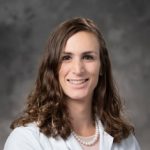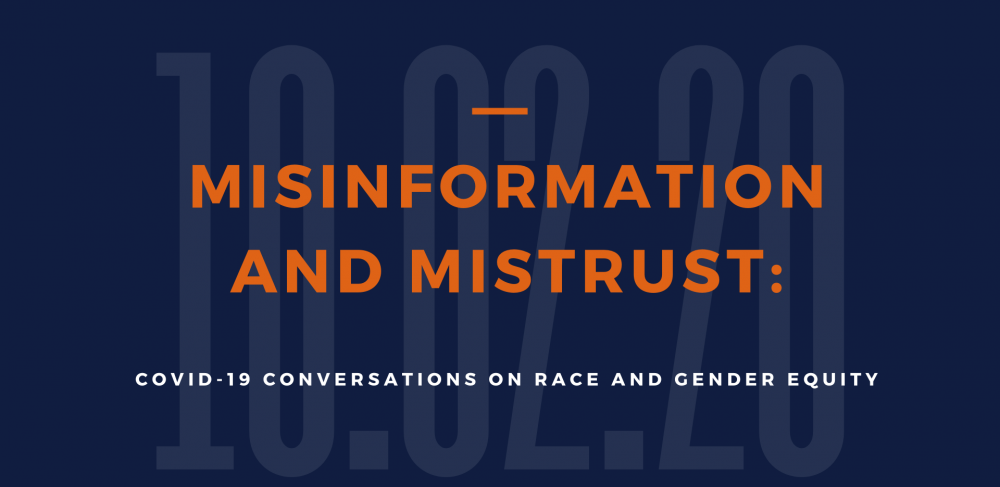Nadine Barrett, Ph.D.
 As a Medical Sociologist with over 15 years of experience engaging diverse health systems and communities to improve community and population health, Nadine Barrett has devoted her career to reducing health disparities among disadvantaged and vulnerable populations and effectively training health care and research professionals and trainees in community engagement, diversity and inclusion, and the principles of authentic and impactful stakeholder collaborations. Her expertise can be defined broadly within the context of developing effective community and health system partnerships to improve health outcomes, and conducting community health assessments to inform strategic priority setting, and program development, implementation and evaluation.
As a Medical Sociologist with over 15 years of experience engaging diverse health systems and communities to improve community and population health, Nadine Barrett has devoted her career to reducing health disparities among disadvantaged and vulnerable populations and effectively training health care and research professionals and trainees in community engagement, diversity and inclusion, and the principles of authentic and impactful stakeholder collaborations. Her expertise can be defined broadly within the context of developing effective community and health system partnerships to improve health outcomes, and conducting community health assessments to inform strategic priority setting, and program development, implementation and evaluation.
Rosa Gonzalez-Guarda, Ph.D.
 Rosa Gonzalez-Guarda is Associate Professor at Duke University School of Nursing and the Faculty Lead for the Population Health Research Area of Excellence for the school’s Center for Nursing Research. She also serves as the Co-Director of the Community Engagement Core for Duke’s Clinical Translational Science Institute. Her research focuses on describing the intersection of intimate partner violence, substance abuse, HIV and mental health among Latinos in the U.S. and the development of culturally-tailored interventions to address these. She uses a syndemic orientation, mixed methods, and community engaged strategies to address these areas of interest.
Rosa Gonzalez-Guarda is Associate Professor at Duke University School of Nursing and the Faculty Lead for the Population Health Research Area of Excellence for the school’s Center for Nursing Research. She also serves as the Co-Director of the Community Engagement Core for Duke’s Clinical Translational Science Institute. Her research focuses on describing the intersection of intimate partner violence, substance abuse, HIV and mental health among Latinos in the U.S. and the development of culturally-tailored interventions to address these. She uses a syndemic orientation, mixed methods, and community engaged strategies to address these areas of interest.
Vashti Johnson, MSN, RN
 Vashti Johnson’s has been a nurse for 15 years with a concentration in long term care and geriatrics. She’s also worked in ambulatory care as a unit manager, infection control, employee health, and worked as a DON in home care, skilled nursing, and assisted living.
Vashti Johnson’s has been a nurse for 15 years with a concentration in long term care and geriatrics. She’s also worked in ambulatory care as a unit manager, infection control, employee health, and worked as a DON in home care, skilled nursing, and assisted living.
Holly Lewis, MD, Ph.D.
 Holly Christopher Lewis is a PGY-2 in the Duke General Surgery Residency. Her clinical & research interests include tissue engineering and reconstructive surgery. She earned her MD and PhD at Emory University, focusing on immunology and chemical biology; she is developing hydrogel models of wound healing and cell therapy with the Duke School of Engineering. She is passionate about addressing disparities in medicine, and the use of bioinformatics to better understand social determinants of health. She is active in outcomes research, publishing on medical racism in sickle cell disease, clinical determinates of poor overall survival after breast cancer, and wound infections and dehiscence in plastic surgery. With faculty from Duke Plastic Surgery, she is leading the Duke Study on Gender Health and Wellness During Covid-19, an initiative to understand how the pandemic has impacted transgender and non-binary patients nationwide.
Holly Christopher Lewis is a PGY-2 in the Duke General Surgery Residency. Her clinical & research interests include tissue engineering and reconstructive surgery. She earned her MD and PhD at Emory University, focusing on immunology and chemical biology; she is developing hydrogel models of wound healing and cell therapy with the Duke School of Engineering. She is passionate about addressing disparities in medicine, and the use of bioinformatics to better understand social determinants of health. She is active in outcomes research, publishing on medical racism in sickle cell disease, clinical determinates of poor overall survival after breast cancer, and wound infections and dehiscence in plastic surgery. With faculty from Duke Plastic Surgery, she is leading the Duke Study on Gender Health and Wellness During Covid-19, an initiative to understand how the pandemic has impacted transgender and non-binary patients nationwide.
Jay Pearson, Ph.D.
 Jay Pearson’s research examines how policy sponsored structural inequality influences social determination of health. He has worked as a health educator with the East Coast Migrant Health Project where he designed and implemented health and safety training for Spanish-speaking factory workers, pesticide safety training with a multi-ethnic farm worker population, and lead poisoning prevention in an impoverished urban community. He is particularly interested in the health effects of conventional and non-conventional resources associated with racial assignment, ethnic identity, national origin, immigration, and cultural orientations.
Jay Pearson’s research examines how policy sponsored structural inequality influences social determination of health. He has worked as a health educator with the East Coast Migrant Health Project where he designed and implemented health and safety training for Spanish-speaking factory workers, pesticide safety training with a multi-ethnic farm worker population, and lead poisoning prevention in an impoverished urban community. He is particularly interested in the health effects of conventional and non-conventional resources associated with racial assignment, ethnic identity, national origin, immigration, and cultural orientations.
Brian Southwell, Ph.D.
 Brian Southwell is an adjunct professor with Duke’s Social Science Research Institute and also has taught for the Energy Initiative. Southwell directs the Science in the Public Sphere program at RTI International and is a member of the faculty at UNC-Chapel Hill. He hosts The Measure of Everyday Life, a weekly public radio show, and is the author of Social Networks and Popular Understanding of Science and Health and edited Innovations in Home Energy Use: A Sourcebook and Misinformation and Mass Audiences.
Brian Southwell is an adjunct professor with Duke’s Social Science Research Institute and also has taught for the Energy Initiative. Southwell directs the Science in the Public Sphere program at RTI International and is a member of the faculty at UNC-Chapel Hill. He hosts The Measure of Everyday Life, a weekly public radio show, and is the author of Social Networks and Popular Understanding of Science and Health and edited Innovations in Home Energy Use: A Sourcebook and Misinformation and Mass Audiences.
Don Taylor, Ph.D.
 Don Taylor is a professor of Public Policy at Duke University and a founding faculty member of the Duke-Margolis Center for Health Policy, among numerous other Duke University affiliations. He is currently the Director of the Social Science Research Institute. Most of his ongoing research is in the area of end of life policy with a focus on patient decision making and Medicare policy on hospice and palliative care.
Don Taylor is a professor of Public Policy at Duke University and a founding faculty member of the Duke-Margolis Center for Health Policy, among numerous other Duke University affiliations. He is currently the Director of the Social Science Research Institute. Most of his ongoing research is in the area of end of life policy with a focus on patient decision making and Medicare policy on hospice and palliative care.
Dane Whicker, Ph.D.
 Dane Whicker is a clinical health psychologist and Medical Instructor at Duke Health within the Department of Psychiatry. He specializes in conducting therapy and behavioral health assessments for transgender individuals seeking medical transition within a multi-disciplinary care team. Dr. Whicker is also the Director of LGBTQ+ Initiatives for Duke’s Office of Diversity and Inclusion at the School of Medicine, and serves as the faculty advisor for DukeMed Pride. He also enjoys teaching 1st year MD, PA, and DPT students about cultural determinants of health disparities. Since coming to Duke, Dr. Whicker has conducted over 70 trainings and workshops on best practices in LGBTQ+ healthcare, within and outside of Duke. He is also the Co-Director of the Equity in Research Core at Duke’s Clinical and Translational Science Institute (CTSI). In that role he is responsible for curricular development and consultation aimed at promoting diversity, equity, and anti-racism in research.
Dane Whicker is a clinical health psychologist and Medical Instructor at Duke Health within the Department of Psychiatry. He specializes in conducting therapy and behavioral health assessments for transgender individuals seeking medical transition within a multi-disciplinary care team. Dr. Whicker is also the Director of LGBTQ+ Initiatives for Duke’s Office of Diversity and Inclusion at the School of Medicine, and serves as the faculty advisor for DukeMed Pride. He also enjoys teaching 1st year MD, PA, and DPT students about cultural determinants of health disparities. Since coming to Duke, Dr. Whicker has conducted over 70 trainings and workshops on best practices in LGBTQ+ healthcare, within and outside of Duke. He is also the Co-Director of the Equity in Research Core at Duke’s Clinical and Translational Science Institute (CTSI). In that role he is responsible for curricular development and consultation aimed at promoting diversity, equity, and anti-racism in research.
Julius Wilder, MD, Ph.D.
 Julius Wilder is a liver transplant physician who will bring us up-to-date information on the health effects of COVID-19, given how much focus there is on mortality.
Julius Wilder is a liver transplant physician who will bring us up-to-date information on the health effects of COVID-19, given how much focus there is on mortality.
